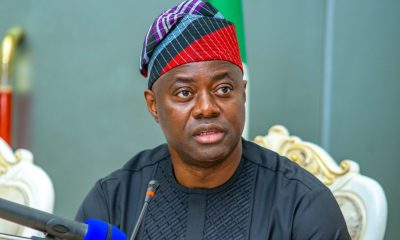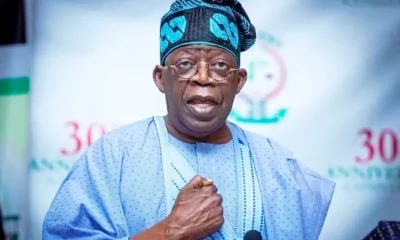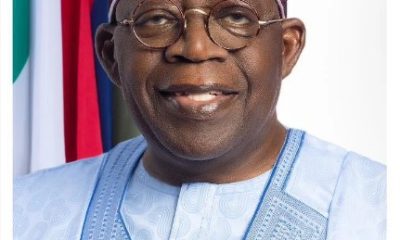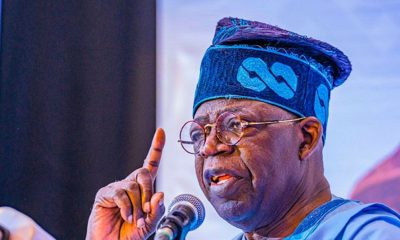Headline
Tinubu inherited A dead economy from Buhari – Onanuga

Last Updated on June 17, 2024 by Fellow Press
The Presidency on Sunday pushed back on claims that Nigeria is going through the worst economic crisis in a generation caused by the policies of President Bola Tinubu, pointing out that the administration inherited the problems.
In a rejoinder to a New York Times (NYT) article titled “Nigeria Confronts Its Worst Economic Crisis in a Generation,” published on June 11, the presidency highlighted the causes of the economic woes and the efforts by the present administration to stem the tide.
According to the rejoinder written by Bayo Onanuga, Special Adviser to President Tinubu on Information and Strategy and made available to correspondents on Sunday, fuel subsidy regime had gulped $84.39 billion between 2005 and 2022 while the Nigeria National Petroleum Company Limited (NNPCL) amassed trillions of naira in debts for absorbing the unsustainable subsidy payments.
The rejoinder asserted that last the administration had spent the sum of $1.5 billion monthly to defend the naira. It said with the past administration servicing debts with up to 97 percent of its revenues amid serious infrastructure deficit, it resorted to massive borrowing to cover costs.
The presidency stated the NYT reflected the typical predetermined, reductionist, derogatory, and denigrating way foreign media establishments reported African countries for several decades.
According to it, most significant about the report is that it painted the dire experiences of some Nigerians amid the inflationary spiral of the last year and blamed it all on the policies of the new administration.
It said the report, based on several interviews, is at best jaundiced, all gloom and doom, as it never mentioned the positive aspects in the same economy as well as the ameliorative policies being implemented by the central and state governments. The presidency added: “To be sure, President Tinubu did not create the economic problems Nigeria faces today. He inherited them.
“As a respected economist in our country once put it, Tinubu inherited a dead economy. The economy was bleeding and needed quick surgery to avoid being plunged into the abyss, as happened in Zimbabwe and Venezuela. This was the background to the policy direction taken by the government in May/June 2023: the abrogation of the fuel subsidy regime and the unification of the multiple exchange rates.
“For decades, Nigeria had maintained a fuel subsidy regime that gulped $84.39 billion between 2005 and 2022 from the public treasury in a country with huge infrastructural deficits and in high need of better social services for its citizens. The state oil firm, NNPC, the sole importer, had amassed trillions of naira in debts for absorbing the unsustainable subsidy payments in its books.
“By the time President Tinubu took over the leadership of the country, there was no provision made for fuel subsidy payments in the national budget beyond June 2023. The budget itself had a striking feature: it planned to spend 97 percent of revenue servicing debt, with little left for recurrent or capital expenditure.
“The previous government had resorted to massive borrowing to cover such costs. Like oil, the exchange rate was also being subsidized by the government, with an estimated $1.5 billion spent monthly by the CBN to ‘defend’ the currency against the unquenchable demand for the dollar by the country’s import-dependent economy.
“By keeping the rate low, arbitrage grew as a gulf existed between the official rate and the rate being used by over 5000 BDCs that were previously licensed by the Central Bank.
What was more, the country was failing to fulfil its remittance obligations to airlines and other foreign businesses, such that FDIs and investment in the oil sector dried up, and notably Emirate Airlines cut off the Nigerian route.
“President Tinubu had to deal with the cancer of public finance on the first day by rolling back the subsidy regime and the generosity that spread to neighbouring countries. Then, his administration floated the naira.
“After some months of the storm, with the naira sliding as low as N1,900 to the US dollar, some stability is being restored, though there remain some challenges. The exchange rate is now below N1500 to the dollar, and there are prospects that the naira could regain its muscle and appreciate to between N1000 and N1200 before the end of the year.
“The economy recorded a trade surplus of N6.52 trillion in Q1, as against a deficit of N1.4 trillion in Q4 of 2023. Portfolio investors have streamed in as long-term investors. When Diageo wanted to sell its stake in Guinness Nigeria, it had the Singaporean conglomerate, Tolaram, ready for the uptake.
“With the World Bank extending a $2.25 billion loan and other loans by the AfDB and Afreximbank coming in, Nigeria has become bankable again. This is all because the reforms being implemented have restored some confidence.
“The inflationary rate is slowing down, as shown in the figures released by the National Bureau of Statistics for April. Food inflation remains the biggest challenge, and the government is working very hard to rein it in with increased agricultural production.
“The Tinubu administration and the 36 states are working assiduously to produce food in abundance to reduce the cost. Some state governments, such as Lagos and Akwa Ibom, have set up retail shops to sell raw food items to residents at a lower price than the market price.
“The Tinubu government, in November last year, in consonance with its food emergency declaration, invested heavily in dry-season farming, giving farmers incentives to produce wheat, maize, and rice.
“The CBN has donated N100 billion worth of fertiliser to farmers, and numerous incentives are being implemented. In the western part of Nigeria, the six governors have announced plans to invest massively in agriculture. With all the plans being executed, inflation, especially food inflation, will soon be tamed.”
The presidency was of the view that Nigeria is not the only country in the world facing a rising cost of living crisis.
“The USA, too, is contending with a similar crisis, with families finding it hard to make ends meet. US Treasury Secretary Janet Yellen raised this concern recently. Europe is similarly in the throes of a cost-of-living crisis. As those countries are trying to confront the problem, the Tinubu administration is also working hard to overturn the economic problems in Nigeria.
“Our country faced economic difficulties in the past, an experience that has been captured in folk songs. Just like we overcame then, we shall overcome our present difficulties very soon,” it pointed out.
Breaking News
ASUU to embark on strike in two weeks if FG fails to honour agreements

Last Updated on June 29, 2024 by Fellow Press
The Academic Staff Union of Universities, ASUU, has declared that it would embark on strike in the next two weeks if agreements with the Federal Government are not met.
The Zonal Coordinator of ASUU, Calabar Zone, Comrade Happiness Uduk, said this while addressing a press conference and protest organized by Calabar Zone of ASUU, at Abia state University, Uturu Main Campus.
She said that various agreements between the union and the Federal government were yet to be honoured, leaving the academic staff and educational sector at large in deplorable condition.
She listed the issues to include no salary increment, salary arrears, poor funding of universities and non-payment of Earned Academic Allowances, among others.
The union rejected the Integrated Personal and Payroll Information System (IPPIS) and the introduction of Treasury Single Account (TSA) in Abia State University, Uturu, and also condemned the victimisation of members of ASUU in Ebonyi State University (EBSU).
It expressed regrets that monthly wages of lecturers have been rubbished by the high cost of living in the country.
ASUU also rejected the Federal Government’s loan package for Nigerian students, warning that it would enslave the students.
“Universities would be shut down for academic activities in the next two weeks. Please take the message to them,” Uduk said.
Also speaking, the Chairman of ASUU in Abia State University, Dr Chidi Mba rejected the Treasury Single Account.
Mba, who said the lecturers are owed between 11 and 14 months salaries, also complained that salaries of some workers were slashed.
The ASUU Chairman called on the Abia State government to increase the funding for the school.
Calabar Zone of ASUU comprises of seven Universities namely University of Calabar, University of Uyo, Alex Ekwueme University, Abia State University, Ebonyi State University and Akwa Ibom State University.
Headline
I don’t want to return to Aso Villa, its stress is too much – Patience Jonathan

Last Updated on June 29, 2024 by Fellow Press
Former First lady, Dame Patience Jonathan. has stated that she wouldn’t want to return to the presidential villa she and her husband, Goodluck Jonathan, occupied for eight years because “the stress of Nigeria is too much.”
While at a public function on Friday, June 28, Mrs Jonathan said;
“If you call me now for villa, I wouldn’t go there. I won’t. Don’t you see how young I am? The stress is so much. The stress of Nigeria is so much. If God manages to bring you out of it, you should glorify God and thank for the lord’s doing because it is marvellous in his eyes. He has taken you there once, why do you want to go there again? Me I won’t go oo!!!” she said
The Jonathans exited the presidential villa in 2015 after Buhari won the elections and was sworn into office.
Watch video below:
-

 Breaking News3 days ago
Breaking News3 days agoFire guts Dangote Refinery in Lagos
-

 Job4 days ago
Job4 days agoOyo govt. begins recruitment of 7,000 primary school teachers, 100 caregivers
-

 Business4 days ago
Business4 days agoNigeria’s public debt stock increases to N121.67trn in Q1 2024 – NBS
-

 Headline6 days ago
Headline6 days agoCourt orders permanent forfeiture of Emefiele’s ₦12b property
-

 Headline6 days ago
Headline6 days agoFood vendors lament rising cost of beans, seek FG’s intervention
-

 Headline5 days ago
Headline5 days agoPast govt ‘lavished’ $100m World Bank Women Empowerment Loan — Minister
-

 Headline5 days ago
Headline5 days agoMinimum Wage: Be patient with Tinubu, Onanuga pleads
























